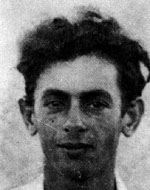Filetsky, Joseph (“Yossi”)
Son of Zvi and Hava. He was born on December 11, 1932 in Bialystok, Poland. He was a member of a working family and was educated in an atmosphere of work and his childhood life was Simcha. His parents perished in the Nazi war and Yossi died immediately after World War II. His uncle was the only member of his family who survived and after the Holocaust he immigrated to Eretz Israel among the immigrants of “Exodus” with his uncle and aunt. For two days he was on board the ship “Exodus” at sea and when he saw the shores of Israel was returned to the shores of Germany. Where they were waiting for aliyah. Finally he went up with the whole family through France; It was in 1947. With them he lived for about two months, but he longed to live in the kibbutz and then joined his friends. Wherever he was, he was one of the outstanding students. He belonged to the Hanoar Haoved movement. At first he toyed with the idea of being an actor but soon realized that his talent was insufficient. He spent many hours with the reading book; In 1920, he joined the regional literature department and moved to Ashdot Ya’akov in 1949 with a part of the youth society. Two years later, in May 1951, he joined the Nahal Brigade. That same year, the group of Ein Harod, as well as youth from Beit Hashita and a group of individuals who were educated in Ashdot Ya’akov, joined this nucleus. At the end of the Nahal Brigade they remained in Kfar Szold under the conditions of the SD. During this period, the ties between Miriam and Yossi became connected and in 1953 he married her. At Ashdot, Yossi became a garden person and in the past two years worked in the vineyard. He was a family man and his family was his whole life. He had never raised his voice to scold his children, and he had always indulged everyone. Yossi loved life and sang joy of life to all around him. He went on reserve duty from time to time and during reserve duty he was also present during the Six-Day War. He was buried in the military cemetery in Afula and later transferred to the eternal rest of the cemetery in Ashdot Ya’akov. His kibbutz published a pamphlet In his memory, in “Kinnarot”, a two-month periodical of the Emek Hayarden Regional Council was commemorated, and his memory was mentioned in the booklet “Who Fell in the War.”
